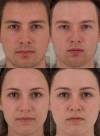Blinded by Beauty: Attractiveness Bias and Accurate Perceptions of Academic Performance
- PMID: 26885976
- PMCID: PMC4757567
- DOI: 10.1371/journal.pone.0148284
Blinded by Beauty: Attractiveness Bias and Accurate Perceptions of Academic Performance
Abstract
Despite the old adage not to 'judge a book by its cover', facial cues often guide first impressions and these first impressions guide our decisions. Literature suggests there are valid facial cues that assist us in assessing someone's health or intelligence, but such cues are overshadowed by an 'attractiveness halo' whereby desirable attributions are preferentially ascribed to attractive people. The impact of the attractiveness halo effect on perceptions of academic performance in the classroom is concerning as this has shown to influence students' future performance. We investigated the limiting effects of the attractiveness halo on perceptions of actual academic performance in faces of 100 university students. Given the ambiguity and various perspectives on the definition of intelligence and the growing consensus on the importance of conscientiousness over intelligence in predicting actual academic performance, we also investigated whether perceived conscientiousness was a more accurate predictor of academic performance than perceived intelligence. Perceived conscientiousness was found to be a better predictor of actual academic performance when compared to perceived intelligence and perceived academic performance, and accuracy was improved when controlling for the influence of attractiveness on judgments. These findings emphasize the misleading effect of attractiveness on the accuracy of first impressions of competence, which can have serious consequences in areas such as education and hiring. The findings also have implications for future research investigating impression accuracy based on facial stimuli.
Conflict of interest statement
Figures



References
-
- Langlois JH, Kalakanis L, Rubenstein AJ, Larson A, Hallam M, Smoot M. Maxims or myths of beauty? A meta-analytic and theoretical review. Psychol Bull. 2000; 126(3):390–423. Available: http://doi.apa.org/getdoi.cfm?doi=10.1037/0033-2909.126.3.390. Accessed 14 December 2013. - PubMed
-
- Kramer RSS, Ward R. Internal facial features are signals of personality and health. Q J Exp Psychol. 2010. November;63(11):2273–87. - PubMed
-
- Penton-Voak IS, Pound N, Little AC, Perrett DI. Personality judgments from natural and composite facial images: More evidence for a “kernel of truth” in social perception. Soc Cogn. 2006. October;24(5):607–40.
-
- Little AC, Burt DM, Penton-Voak IS, Perrett DI. Self-perceived attractiveness influences human female preferences for sexual dimorphism and symmetry in male faces. Proc R Soc B Biol Sci. 2001. January 7;268(1462):39–44. Available: http://www.pubmedcentral.nih.gov/articlerender.fcgi?artid=1087598&tool=p.... Accessed 29 January 2014. - PMC - PubMed
MeSH terms
LinkOut - more resources
Full Text Sources
Other Literature Sources

